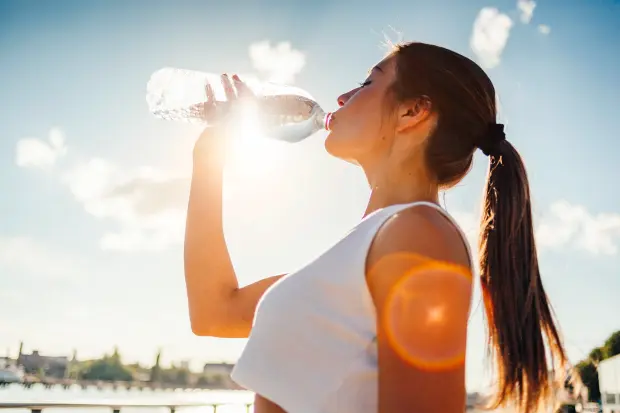“They can help greatly improve hydration, especially when used during intense physical activity,” says nutritionist.
The interest in electrolytes is increasingly noticeable. The electrolyte blends market has grown from $36.56 billion in 2023 to $40.32 billion in 2024, according to a new study.
That 10.3% increase may be a reflection of an increasingly health -conscious population , but there may be something to TikTok (where every wellness content creator worth their salt starts their day with an electrolyte boost ). what to do with this.
Table of Contents
What are electrolytes?
Electrolytes are electrically charged minerals that regulate essential chemical reactions in the body, such as pH balance and nerve and muscle contraction. They also help maintain fluid balance inside and outside of cells, so they can help keep the body optimally hydrated. Although we lose electrolytes daily through the excretion of sweat and urine, most of what we need comes from a healthy, balanced diet. However, if your diet is not adequate, you exercise a lot or you find it difficult to consume your daily quota of water, electrolytes can be a good support.

Electrolytes are not just salts
“Sodium is the electrolyte most people are familiar with, but magnesium, potassium and calcium are other main electrolytes,” explains nutritionist. “If we think about how important magnesium alone is for mood, stress, sleep, and metabolism, we can begin to see how important it is to maintain a good electrolyte balance.” Like magnesium, calcium – another electrolyte – is vital for nerve and muscle function, and for building and maintaining strong teeth and bones. Potassium, for its part, is essential for moving nutrients through the body and helping it eliminate unwanted waste.
Electrolytes for exercise and physical activity
Electrolytes have traditionally been the supplement of choice for athletes, but you don’t have to be a full-time runner or professional bodybuilder to benefit from them; anyone who exercises can benefit: “They can help greatly improve hydration, especially during intense physical activity,” says nutritionist . “In addition, they promote muscle function and can increase endurance, so maintaining a constant balance of electrolytes can also help avoid dehydration during periods of excessive sweating or in hot climates.” In addition to allowing adequate muscle contractions (which means fewer cramps), a lack of electrolytes can also affect the ability to build muscle, so achieving the right balance is important when consuming them.
Electrolytes and their relationship with stress
Even if your training program is comprehensive and well-proportioned, there are other conditions and lifestyle factors that could mean you need additional electrolyte support . If you follow a low-carb, high-fat keto diet, your body will produce ketones to burn fat as an energy source instead of glucose, a process that involves the loss of water and, consequently, electrolytes. “Chronic stress and anxiety deplete potassium (as does too much caffeine), and dietary surveys consistently show that women in particular do not meet average potassium values,” adds nutritionist.
“Potassium is essential for nervous system function, cognitive health, mood, stress and, in combination with magnesium (also chronically low in our diets), can contribute to a calmer and more stable mood ”, and adds that breastfeeding can also increase the need to consume electrolytes, although it is advisable to consult your doctor before introducing supplements into your routine.

Electrolytes are not a replacement for water
If drinking water seems like a chore, it may be tempting to swap it for something more interesting. But, if you start using electrolyte, don’t forget about water. Although there is evidence to suggest that electrolytes are good for rehydrating after illness, intense exercise, or in very hot weather, for most people water is the best hydration option. In other words, taking electrolytes is not so much a necessity as a choice. “The frequency and amount of electrolytes you should consume depends largely on your level of physical activity and personal health”. “However, it is safe for most people to use electrolyte packets daily, especially when engaging in rigorous training or activities that cause heavy sweating.”
Eat a healthy and balanced diet
If you’re still unsure whether they should be part of your daily regimen, as with any type of non-food supplement, it’s important to first look at what you’re getting from your diet and whether you can increase your electrolyte quota that way. Foods rich in potassium include green leafy vegetables, salmon, white beans, and avocado; while spinach, pumpkin seeds, tofu and oats are good sources of magnesium.
That said, it’s important to keep in mind that even whole sources of certain minerals may not be enough: “Our basic electrolyte needs are quite high” “a banana is said to be a potassium-rich superfood, but a “Bananas only provide us with 11% of our electrolyte load, so there is a long way to go in terms of intake.” If you follow a low-carb diet, electrolyte can be especially beneficial for increasing your energy level.
Contraindications of electrolytes
“While they can be a helpful addition to your wellness regimen, don’t let the glare of social media cloud your judgment. Too many electrolyts can be as harmful as too little, so moderation and balance are key,” reveals nutrionist, while they also warns against excess sodium. “Endurance athletes may be more indulgent with sodium-rich el ectrolyte drinks, but the average individual doesn’t need more sodium, especially if their diet is high in ultra-processed foods,” she notes.
The same warning applies to people with certain medical conditions, such as kidney disease or any other condition that affects the body’s ability to properly balance minerals. In addition to being wary of excess sodium, you also need to be careful with sugar, especially if you opt for sports drinks that pose as electrolyte substitutes: “It’s important to separate sports drinks from electrolytes” . “Yes, sports drinks contain electrolytes, but the average large bottle of brand-name sports drink can also pack in 36 grams of sugar, so it wouldn’t be a healthy addition to your routine.”




